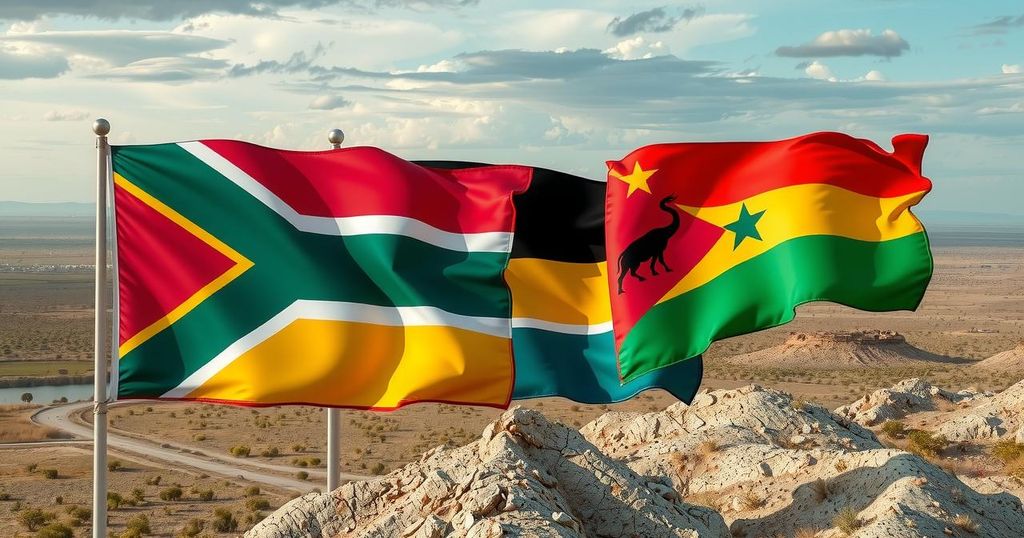Elections in Southern Africa: Challenges and Calls for Change

The 2024 election results in Southern Africa reveal distinctive political dynamics across South Africa, Botswana, Mozambique, and Namibia, signaling a demand for change. South Africa’s coalition government emergence indicates a shift as the ANC loses its majority. Botswana’s political transition reflects dissatisfaction with the BDP due to economic woes, while Mozambique faces unrest under Frelimo’s continued rule. Namibia shows a solidified power hold amid calls for reform, highlighting varying regional impacts and the electorate’s desire for accountability and change.
As the results of the 2024 elections unfold in Southern Africa, a clear necessity for political renewal emerges across several nations, notably South Africa, Botswana, and Mozambique. Each scenario, while interconnected, bears unique characteristics that defy a simplistic interpretation of a unanimous ‘wind of change.’ In South Africa, the coalition government formed following the ruling African National Congress (ANC) losing its majority marks a pivotal moment, reflecting an overarching desire for change amidst societal unrest and dissatisfaction with the ANC. South Africa’s challenges align with the rise of alternative political parties, notably the uMkhonto weSizwe party, which has harnessed historical narratives and present grievances to reclaim support from disillusioned voters.
Botswana presents a contrasting narrative, having experienced political stability under the Botswana Democratic Party (BDP), which has governed since independence in 1966. The recent electoral shift, led by the opposition Umbrella for Democratic Change, reveals the populace’s growing discontent over economic issues and inequalities that have persisted despite Botswana’s economic growth. Citizens are clamoring for genuine change as they grapple with high unemployment, particularly among youth, and rising living costs. The new leadership faces significant pressure to transition away from an overdependence on diamond mining, aiming for job creation and economic diversification to remedy these challenges.
In Mozambique, the landscape is fraught with demands for reform, especially among urban and middle-class citizens who find the long-standing Frente de Libertação de Moçambique (Frelimo) party inadequate. Despite governmental allegations of electoral fraud and violence, Frelimo maintains control, reflecting deeper societal divisions and unrest as opposition leaders, like Venâncio Mondlane of Podemos, call for significant political reforms. The political environment remains tense, with increasing protests in response to perceived injustices, further exacerbated by violent conflicts in the northern province.
Conversely, Namibia’s November elections mirrored a stabilization of existing political structures, affirming the South West Africa People’s Organisation’s (SWAPO) continuing dominance. The election of Netumbo Nandi-Ndaitwah, a woman from the older party establishment, albeit progressive for the region, did not significantly alter the political landscape. Voter fatigue against the ruling party’s promises is apparent, as diminished youth engagement suggests a yearning for transformation that remains unfulfilled.
In summary, the electoral outcomes across Southern Africa reveal a heightened awareness and demand for change from citizens frustrated by unmet economic promises and growing social inequalities perpetuated by historic liberation movements. The electorate is increasingly disengaging from traditional narratives of liberation in favor of pragmatic solutions to contemporary issues. Thus, ruling political entities must heed these electoral signals and address the underlying grievances if they wish to sustain their governance and avoid further upheaval.
Southern Africa, a region marked by historical liberation struggles, is experiencing a complex narrative as elections unfold in key countries such as South Africa, Botswana, Mozambique, and Namibia. These elections have become indicators of a potential political transformation, characterized by a demand for accountability and responsive governance. The influence of former liberation movements continues to shape political landscapes; however, changing societal dynamics, especially among younger and urbanized populations, are increasingly challenging the status quo. As established parties grapple with modern issues such as unemployment and economic diversity, the socio-political context evolves, necessitating thoughtful analysis.
In conclusion, the recent elections in Southern Africa illustrate a transformative period marked by citizens’ growing demands for accountability and change. While traditional liberation movements maintain substantial influence, the electorate’s shifting priorities toward economic stability and social equity signal a growing disconnect between historical narratives and contemporary governance. The findings from these elections underscore an urgent call for political leaders to deliver on their promises and adapt to the evolving dynamics of their populations or risk losing their political relevance.
Original Source: www.fairobserver.com







